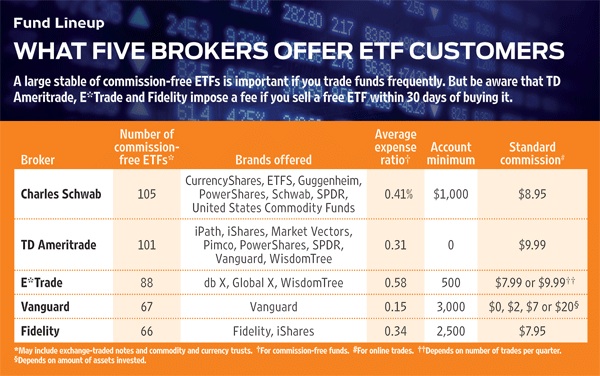Best Brokers for Free ETFs
You won’t pay a commission, but you may get hit with a fee if you sell too soon.

Profit and prosper with the best of Kiplinger's advice on investing, taxes, retirement, personal finance and much more. Delivered daily. Enter your email in the box and click Sign Me Up.
You are now subscribed
Your newsletter sign-up was successful
Want to add more newsletters?

Delivered daily
Kiplinger Today
Profit and prosper with the best of Kiplinger's advice on investing, taxes, retirement, personal finance and much more delivered daily. Smart money moves start here.

Sent five days a week
Kiplinger A Step Ahead
Get practical help to make better financial decisions in your everyday life, from spending to savings on top deals.

Delivered daily
Kiplinger Closing Bell
Get today's biggest financial and investing headlines delivered to your inbox every day the U.S. stock market is open.

Sent twice a week
Kiplinger Adviser Intel
Financial pros across the country share best practices and fresh tactics to preserve and grow your wealth.

Delivered weekly
Kiplinger Tax Tips
Trim your federal and state tax bills with practical tax-planning and tax-cutting strategies.

Sent twice a week
Kiplinger Retirement Tips
Your twice-a-week guide to planning and enjoying a financially secure and richly rewarding retirement

Sent bimonthly.
Kiplinger Adviser Angle
Insights for advisers, wealth managers and other financial professionals.

Sent twice a week
Kiplinger Investing Weekly
Your twice-a-week roundup of promising stocks, funds, companies and industries you should consider, ones you should avoid, and why.

Sent weekly for six weeks
Kiplinger Invest for Retirement
Your step-by-step six-part series on how to invest for retirement, from devising a successful strategy to exactly which investments to choose.
The appeal of exchange-traded funds is undeniable: low fees, predictability and transparency. Now you can add one more plus: Big online brokers are fighting fiercely for customers by letting them trade certain ETFs without commissions.
The broker war heated up with Fidelity’s announcement that it would more than double the number of ETFs it offers commission-free. But Fidelity caused a stir when it said it would soon start charging clients a fee if they sold a “free” ETF within 30 days of purchase.
Fidelity’s move prompted us to wonder which of five big online brokers offer the best deals on ETFs. We based our judgment on the number and quality of free ETFs, their expense ratios, and any fees that may apply. Of course, you can trade funds that are not part of a free-ETF program at standard commission rates, which are listed in the table at right. The firms are listed in order of the number of free ETFs offered. (We use the term ETFs to refer to all similar products, including exchange-traded notes and commodity and currency trusts.)
From just $107.88 $24.99 for Kiplinger Personal Finance
Become a smarter, better informed investor. Subscribe from just $107.88 $24.99, plus get up to 4 Special Issues

Sign up for Kiplinger’s Free Newsletters
Profit and prosper with the best of expert advice on investing, taxes, retirement, personal finance and more - straight to your e-mail.
Profit and prosper with the best of expert advice - straight to your e-mail.
Charles Schwab’s lineup of commission-free ETFs features 105 funds. They include its own Schwab ETFs and funds from six other families, including PowerShares and State Street Global SPDR. In addition to the standard fare—U.S. and foreign stock funds and bond funds—Schwab offers several commodity and currency trusts. The average expense ratio of the free funds is on the higher end of our list, but the range of offerings makes Schwab attractive for ETF investors. Schwab is one of two firms on this list that do not charge for selling a fee-free ETF quickly.
TD Ameritrade offers 101 commission-free ETFs from eight providers, among them iShares and Vanguard. The funds include a handful of commodity trusts and one currency trust, as well as ETFs that track standard indexes. TD scores well for variety, but if you sell a fee-free ETF within 30 days, you’ll have to pay $19.99.
E*Trade marches to its own beat. Its 88 free ETFs focus on specialty and alternative funds from Deutsche Bank, Global X and WisdomTree. That makes E*Trade a fine choice if you’re looking for a cheap way to invest in the shares of, say, gold miners or in stocks of a single country, such as China. Because of the focus on specialty funds, E*Trade’s free ETFs carry the highest average expense ratio on our list. Plus, the broker charges $15.99 or $19.99 for selling a free ETF within 30 days of purchase.
Vanguard offers 67 Vanguard-labeled ETFs without commission. As you would expect from the fund industry’s low-cost leader, Vanguard’s free ETFs carry, on average, the lowest expense ratios among the five brokers. But don’t look to Vanguard for exotic ETFs. All of its free ETFs are either stock or bond funds, making Vanguard suitable for the keep-it-simple crowd. Vanguard does not levy an early-exit fee.
Fidelity recently upped the number of its free ETFs from 31 to 66—one under its own label and the rest from iShares. Traditional stock and bond funds dominate the list, but also included are four ETFs that invest in commodity stocks. Starting August 1, Fidelity will assess a $7.95 penalty for selling a free ETF within 30 days of purchase.

Profit and prosper with the best of Kiplinger's advice on investing, taxes, retirement, personal finance and much more. Delivered daily. Enter your email in the box and click Sign Me Up.

-
 Over 65? Here's What the New $6K 'Senior Deduction' Means for Medicare IRMAA Costs
Over 65? Here's What the New $6K 'Senior Deduction' Means for Medicare IRMAA CostsTax Breaks A new deduction for people over age 65 has some thinking about Medicare premiums and MAGI strategy.
-
 U.S. Congress to End Emergency Tax Bill Over $6,000 Senior Deduction and Tip, Overtime Tax Breaks in D.C.
U.S. Congress to End Emergency Tax Bill Over $6,000 Senior Deduction and Tip, Overtime Tax Breaks in D.C.Tax Law Here's how taxpayers can amend their already-filed income tax returns amid a potentially looming legal battle on Capitol Hill.
-
 5 Investing Rules You Can Steal From Millennials
5 Investing Rules You Can Steal From MillennialsMillennials are reshaping the investing landscape. See how the tech-savvy generation is approaching capital markets – and the strategies you can take from them.
-
 Best Banks for High-Net-Worth Clients
Best Banks for High-Net-Worth Clientswealth management These banks welcome customers who keep high balances in deposit and investment accounts, showering them with fee breaks and access to financial-planning services.
-
 Stock Market Holidays in 2026: NYSE, NASDAQ and Wall Street Holidays
Stock Market Holidays in 2026: NYSE, NASDAQ and Wall Street HolidaysMarkets When are the stock market holidays? Here, we look at which days the NYSE, Nasdaq and bond markets are off in 2026.
-
 Stock Market Trading Hours: What Time Is the Stock Market Open Today?
Stock Market Trading Hours: What Time Is the Stock Market Open Today?Markets When does the market open? While the stock market has regular hours, trading doesn't necessarily stop when the major exchanges close.
-
 Bogleheads Stay the Course
Bogleheads Stay the CourseBears and market volatility don’t scare these die-hard Vanguard investors.
-
 The Current I-Bond Rate Is Mildly Attractive. Here's Why.
The Current I-Bond Rate Is Mildly Attractive. Here's Why.Investing for Income The current I-bond rate is active until April 2026 and presents an attractive value, if not as attractive as in the recent past.
-
 What Are I-Bonds? Inflation Made Them Popular. What Now?
What Are I-Bonds? Inflation Made Them Popular. What Now?savings bonds Inflation has made Series I savings bonds, known as I-bonds, enormously popular with risk-averse investors. How do they work?
-
 This New Sustainable ETF’s Pitch? Give Back Profits.
This New Sustainable ETF’s Pitch? Give Back Profits.investing Newday’s ETF partners with UNICEF and other groups.
-
 As the Market Falls, New Retirees Need a Plan
As the Market Falls, New Retirees Need a Planretirement If you’re in the early stages of your retirement, you’re likely in a rough spot watching your portfolio shrink. We have some strategies to make the best of things.